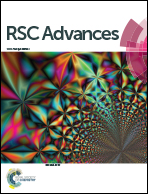Effect of charge transfer and periodicity on the magnetism of [Cr(Cp*)2][ETCE]†
Abstract
Magnetism in metallocene based donor–acceptor complexes stems from the donor to acceptor charge transfer. Thus, to correlate the exchange coupling constant J and the charge transfer integral, a formalism is developed which enables one to obtain the coupling constant from the value of the charge transfer integral and the spin topology of the system. The variance in the magnetic interaction between donor and acceptor is also investigated along two perpendicular directions in the three dimensional crystal structure of the reference system, decamethylchromocenium ethyl tricyanoethylenecarboxylate [Cr(Cp*)2][ETCE]. These donor–acceptor pairs (V-pair and H-pair), oriented along vertical and horizontal directions respectively, are found to have different extents of J, which is attributed to the difference in exchange coupling mechanisms, viz., direct exchange and superexchange. Next, V-pair and H-pair are taken together to treat both the intrachain and interchain magnetic interactions, since this competition is necessary to decipher the overall magnetic ordering in the bulk phase. In fact, this truncated model produces a small positive value of J supporting the weak ferromagnetic nature of the complex. Lastly, a periodic condition is imposed on the system to comprehend the nature of magnetism in the extended system. Interestingly, the ferromagnetism, prevailing in the aperiodic system, turns into weak antiferromagnetism in the periodic environment. This is explained through the comparison of density of states (DOS) plots in aperiodic and periodic systems. This DOS analysis reveals proximity of the donor and acceptor orbitals, facilitating their mixing in periodic conditions. This mixing causes the antiferromagnetic interaction to prevail over the ferromagnetic one, and imparts an overall antiferromagnetic nature in periodic conditions. This change over in magnetic nature with the imposition of periodicity may be useful to understand the dependence of magnetic behavior with dimensionality in extended systems.
![Graphical abstract: Effect of charge transfer and periodicity on the magnetism of [Cr(Cp*)2][ETCE]](/en/Image/Get?imageInfo.ImageType=GA&imageInfo.ImageIdentifier.ManuscriptID=C3RA47360K&imageInfo.ImageIdentifier.Year=2014)

 Please wait while we load your content...
Please wait while we load your content...